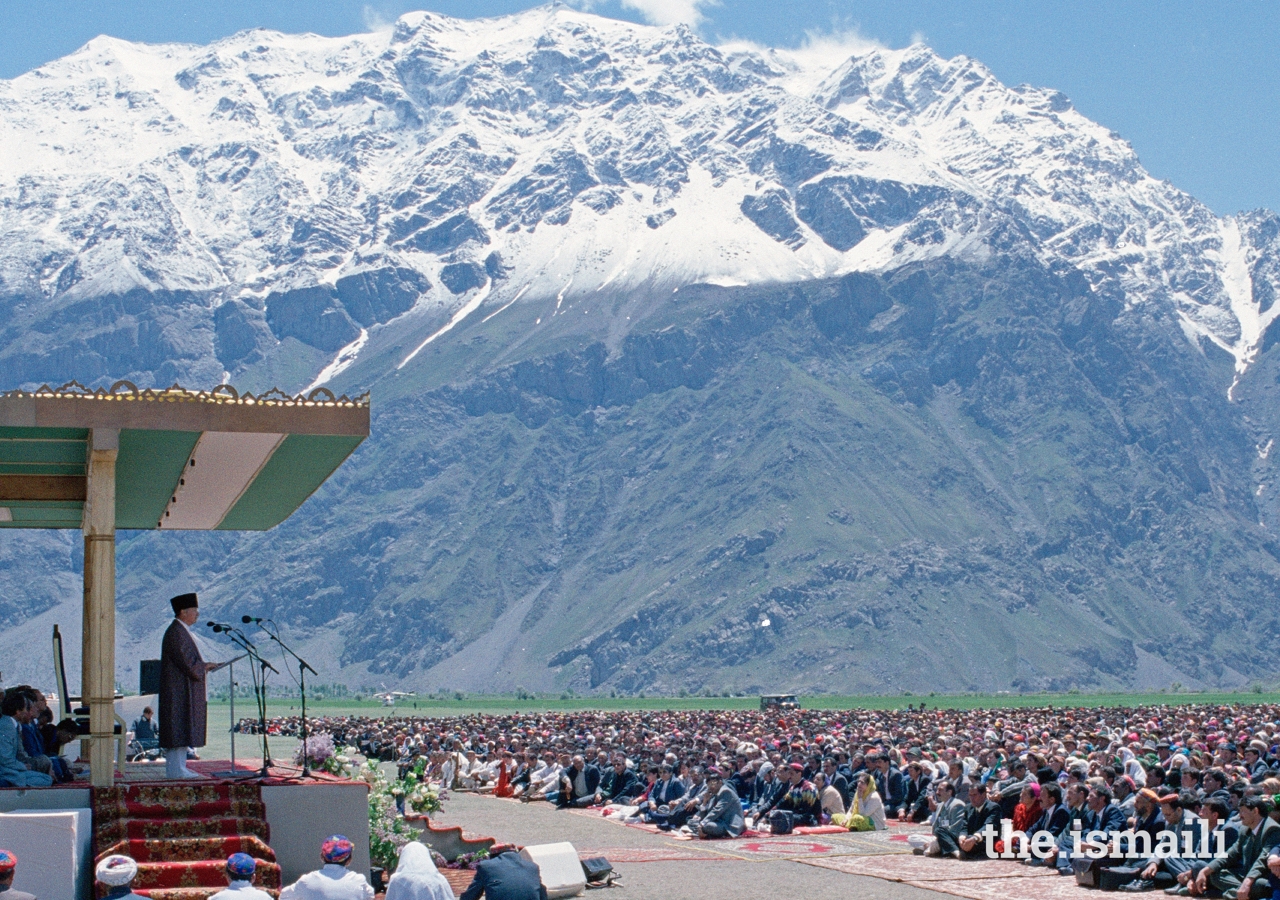Didor (or Didar), a Persian word, means vision or “to see.” In 1995, for the first time after many generations, the Tajik Jamat were blessed with the opportunity to see the Imam-of-the-Time in person, and looked forward to the mulaqat with great anticipation. Many travelled long distances by foot to be present on the day.
“I was a newborn baby, so I cannot remember anything from that time,” says Didor Marodaseynov, now aged 29. “But from the stories my family told me, my grandmother sacrificed her strong wish to attend the mulaqat in order to look after me, since I was only a few days old.”
The day has come to be known as Roz-e-Nur, or the “Day of Light.” The Jamat from Tajikistan describes it as the special day when light entered Badakhshan, the anniversary of which is joyfully celebrated on 24 and 25 May each year.
Mawlana Hazar Imam made his first visit to Tajikistan during one of the most delicate times in the country’s history. In 1991, the state had declared independence following the collapse of the Soviet Union, of which it had been a part since 1924.
A civil war was fought from 1992, inflicting severe hardship on the country’s people. The arrival of Hazar Imam in the spring of 1995 brought hope to the region. Peace was achieved in 1997.
Just as 24 May 1995 marked a new chapter in the history of the Jamat in the region, the hope is that Roz-e-Nur this year brings peace, stability, and a bright future.
Boys named Didor, girls named Didora, and other children born at that time embody the hopes of the wider Jamat, and prompt fond memories for those who were there. Elder generations tell stories of how the wind blew and how the sun shone when Mawlana Hazar Imam arrived for the mulaqat. These tales are shared with younger generations to keep the memories alive.
“From when Hazar Imam arrived until the time he left, almost everyone cried. Those were tears of joy. We were happy that finally we had a mulaqat with Hazar Imam. Our Afghan brothers and sisters watched from the other side of the river,” recalls 68-year-old Ashurova Murodbegim of Ishkashim. “For the first time in a long time, we had the opportunity to see the Imam. We hugged and congratulated each other for making it to this day.”
Traditionally, celebrations begin early in the morning when people come out into the street and gather in big groups. They wear traditional clothes, sing and dance, and cook hearty meals. Everyone is welcomed to join the celebration and partake in the meals. Concerts also take place in parks with traditional music, dance, and poetry.
“My parents often mention that thousands of people walked 15 kilometres from Khorog to Porshnev, a small town in Shugnan, for the mulaqat,” says Anisa Alinazarova, a resident of Khorog, born in 1998. “From their stories, their journey was accompanied by singing and dancing and the joy of meeting the Imam for the first time. Because of this, the journey did not feel as long as it would have otherwise.”
Some Ismailis from Tajikistan who now live in other parts of the world continue to mark Roz-e-Nur. Communities in the USA and elsewhere come together for concerts, exhibitions of Pamiri culture, and sports events.
“My parents say this was the day when for the first time they saw the Imam - someone whom they have always heard about, guessed something about, had imaginations about, but had never seen,” says 19-year-old Shokhrukh Davlatmamadov, who grew up and lives in Moscow. “For us, just like for our parents, it is a historic day and just like any other festival, we celebrate it to keep the memory of that special day alive.”
In an Irshad Mubarak to the Jamat gathered at Porshnev, Badakhshan, on 25 May 1995, Mawlana Hazar Imam expressed his aspirations for the Jamat and society.
“As I look to the future of Tajikistan, with its variegated population, and as I look at the Ummah, I conclude that every and all those peoples, if they wish to achieve a better life for themselves in the generations ahead, must absolutely achieve peace within their societies and, because we are Muslim, conflict must be replaced by a peace which is predicated on the ethics of our faith.”
This message of peace is as appropriate today as it has ever been.
For those like Didor and Anisa, who live in Khorog, and for Tajik Ismailis in other parts of the world, the occasion of Roz-e-Nur evokes memories that will be treasured deep in their hearts forevermore.








